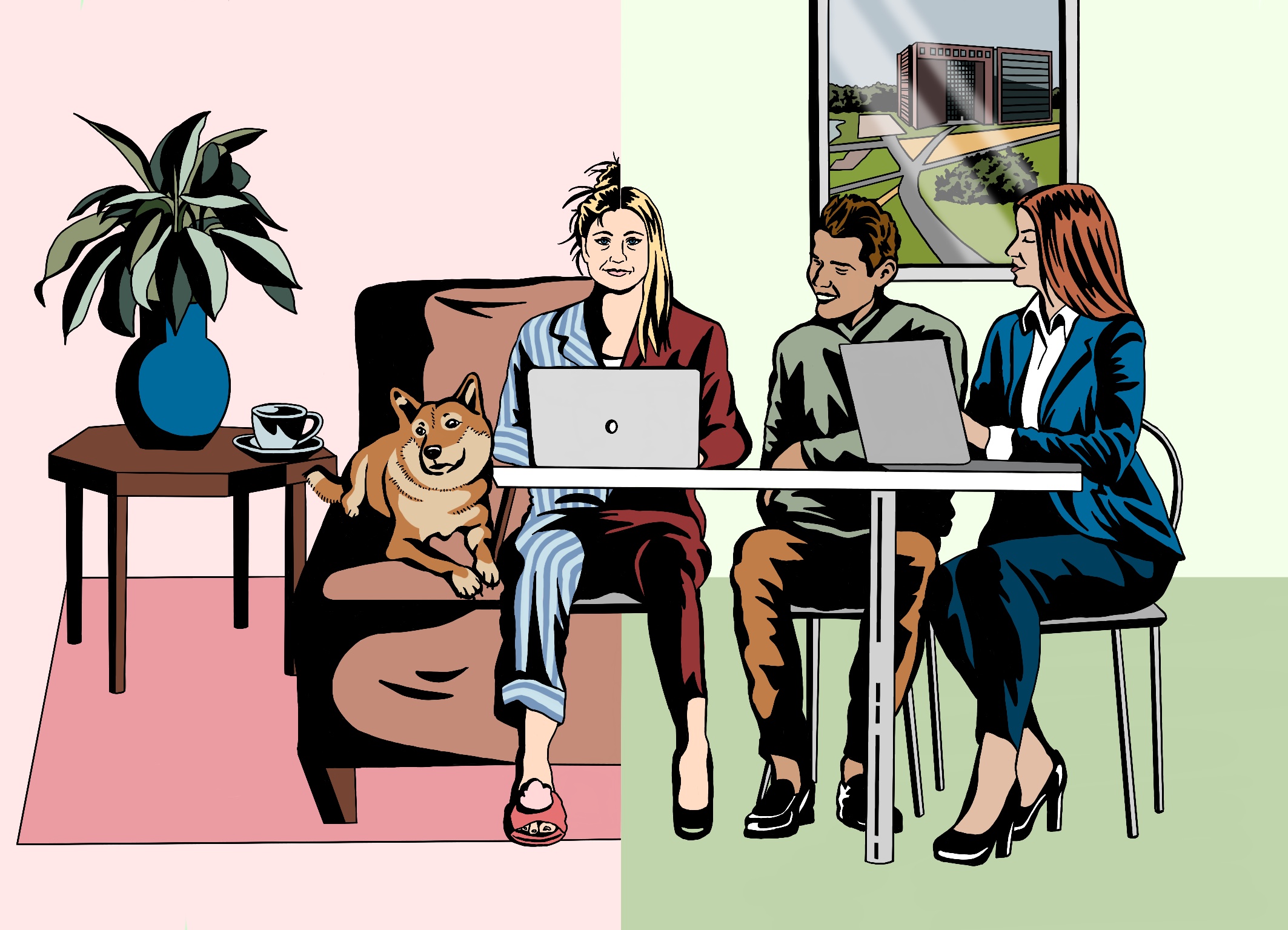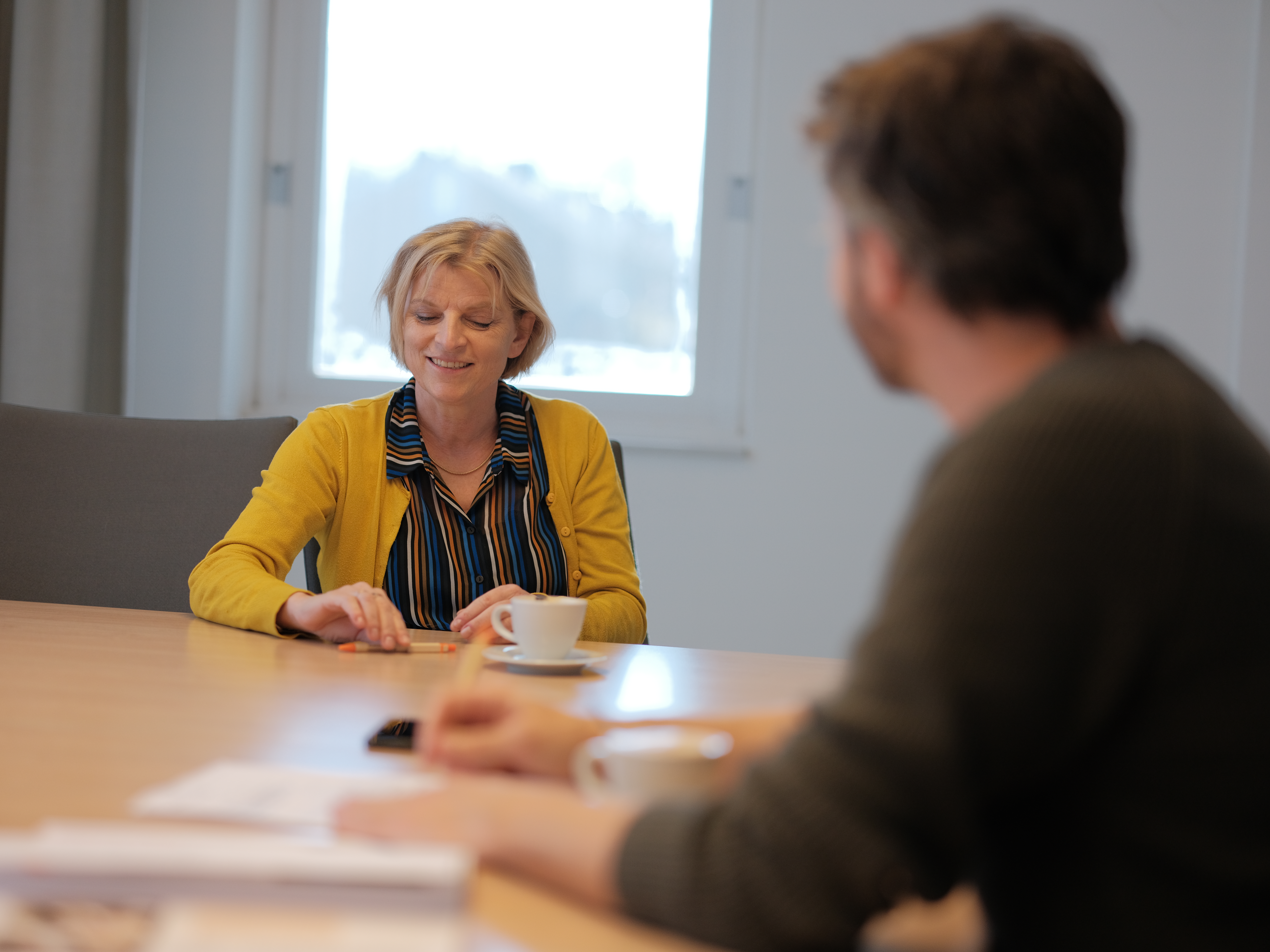Now that working from home is allowed rather than compulsory, a kind of balance is slowly emerging. Working from home is pleasant but it has its downsides too, as a tour of the campus on a typical Thursday showed.
The nub of the Strategic Housing Plan adopted last year is the idea that employees will work from home and share desks. That combination was supposed to tackle the lack of workstations. But that shortage doesn’t seem to be too bad at the moment. Due to Covid, working from home has been so whole-heartedly embraced that there are enough workstations to go round. The campus car parks, however, are just as full as they were before Covid.
Inside the buildings, you get mixed impressions. In the corridors of Lumen, it is quiet and only the odd room is occupied. Jan den Ouden (Forestry and Ecology) is present, and that is not by chance. ‘I always work here. Home is home. I find it difficult to combine these two roles. I do enough work at home in the evenings and at weekends, because otherwise I wouldn’t get the job done. Here I’m in my working mode, I have all my stuff here as well as the colleagues, who I can drop in on from time to time to ask them something.’
According to Den Ouden, there are no strict rules about working from home in his group. ‘We get to judge it for ourselves. Only the chair group meeting is in-person, with an online option for anyone who can’t make it. I would estimate that about three quarters of the people are there in person.’ Den Ouden views the changes that have been made with surprise. ‘Before Covid, you could work from home on one or two days, after consultation. Now it’s the other way round. It seems as if we are allowed to come to work, as an exception. Now I still have my own room. But if that becomes impossible, I’m going to work at home, too. I can’t work with someone else in one room. That’s just the way I am. So I’ll just have to work at home; that’s the price I’ll have to pay.’
Concentration
‘I work three days a week here in Zodiac and one and a half at home’, says associate professor of Cell Biology and Immunology Christine Jansen. ‘It’s quite busy here today. We all work part of the week at home’, she continues. ‘But as time goes by, I get the impression that more and more people are working in the office. There have also been periods when hardly anyone was here. Nothing has been formally agreed as to who is where on what day. We try to be on campus for the meetings on Mondays as often as possible.’
Most colleagues are in the office for at least two days
Jansen started at WUR at the end of 2020, in times of Covid, and was forced to work from home a lot. ‘So I like being here and meeting people. Most of my colleagues spend at least two days at the office. The combination of home and office is nice, but I prefer working at the office. I can concentrate well at home, but I miss the interaction and the spontaneous chats at the coffee machine. The agreement is that we will work partly at home, because of the shortage of workstations. There is still room for everyone now, but when it gets busier, not everyone will be able to be here all the time.’
Always at home
‘I’m still figuring it out myself,’ he continues. ‘I spend three days here and two at home. Sometimes I go back and forth, because I live nearby. I prefer holding online meetings from home. The group meets every Monday in the lunch hour, in principle in person. I think we get together enough to do things again the way we used to. But especially for supervisors, the challenge is to be here regularly and not only for appointments. Most PhD students work on campus and they need to be able to drop in on their supervisors for a quick chat. The same applies to thesis students. It is a lot easier to ask a question if your supervisor is here than if they are at home.’
One place that has stayed quiet since Covid is Atlas. Most of the time, in the building that houses the executive board and others, you could fire a cannon without hitting anyone. Business Information Specialist Annette Breemer (Wageningen Economic Research) happens to be there today. She hasn’t been in the office much since Covid. ‘I don’t normally come in unless I have appointments. I can do my job very well at home in a quiet environment.’ But she does admit to missing the contact at home. ‘It’s nice to meet other colleagues here again. I’ve just joined a new team here in Wageningen. My previous team was in The Hague. I expect I will be in the office on about two days a week. On the other two days I’ll work at home.’
Isolation
‘In theory, we’re allowed to come in to the office every day’, says Breemer’s colleague in Atlas Mireille van Hilten, a researcher in Business Informatics Agrifood. ‘But if everyone does that, there won’t be enough workstations. That is not yet the case.’ Van Hilten is critical of working from home. ‘My experiences in the Covid time were not pleasant, to put it mildly. Neither physically nor mentally. At home you sit still much more than at the office, where you have all kinds of social interaction. I really missed that social interaction. Things that other people say they get too distracted by at the office. But being distracted is work too! It’s all part of the job. I’m very happy that I can come in to the office with no restrictions again. I prefer to work three days at the office and two half-days at home.’
It has come to feel so normal to work in isolation
Van Hilten thinks that too much work is being done at home. ‘I get the impression that a lot of people only work at home. It’s always the same people who come in to the office. From the organization’s point of view, that worries me. Of course, it depends on the kind of work you do, and on your personality and home situation, but on the whole, I think not enough people come in to the office. How does that affect your health and your sense of connection with the work, and how will working from home affect the quality of the work in the longer term? We may find it very comfortable to live a more secluded life, but I don’t know if it’s a good thing. And it also has implications for other people who do seek social contact at work. Who with, then? It has come to feel so normal to work in isolation that we underestimate how good it is to be together again.’
We work from home half the time
Over two months after the recommendation to work from home was lifted, WUR staff seem to have got into a new routine. That is the cautious conclusion based on the use of IT facilities. Those figures show that on an average Tuesday or Thursday, about 3600 people access WUR services via VPN. That is half the total number of employees.
Since 16 March, we have been able to work on campus or at any other WUR location, but it took at least one and a half months before a new equilibrium was found. At the request of Resource, network manager Floris Jan Zwaan has monitored the figures — which are normally only kept one month. They showed an initial steady decrease in VPN usage (by three per cent) but usage has stabilized over the past month.
That equilibrium is also reflected in the number of ‘authenticated clients’, devices that are connected (wireless or plugged in) to the network on campus. Zwaan does however point out that the picture is distorted by the many public holidays and days off in the last while. The growth in connections on campus matches the decline in VPN usage.

 Employees are allowed to work at home for part of the week and share desks in the office. Illustration Valerie Geelen
Employees are allowed to work at home for part of the week and share desks in the office. Illustration Valerie Geelen 

